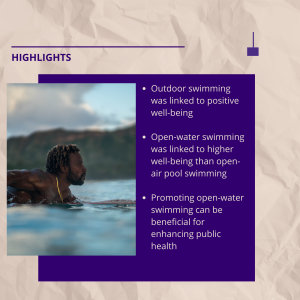The Psychological Benefits of Open-Water (Wild) Swimming: Exploring a Self-Determination Approach Using a 19-Country Sample
Citation
Groeneveld, W., Krainz, M., White, M. P., Heske, A., Elliott, L. R., Bratman, G. N., … & Wheeler, B. W. (2025). The psychological benefits of open-water (wild) swimming: Exploring a self-determination approach using a 19-country sample. Journal of Environmental Psychology, 102558. doi.org/10.1016/j.jenvp.2025.102558
Research shows that outdoor swimming can be good for mental health and well-being. This study looked at 1,200 outdoor swims in 19 countries. It compared how people felt after swimming in open-water spots like lakes or the ocean (called wild swimming) versus open-air swimming pools.
Both types of swimming were linked to feeling happier and less stressed. However, wild swimming gave an extra boost to positive feelings. This seemed to be because people felt more free and skilled when swimming in natural waters. The study suggests that wild swimming might offer special mental health benefits, and it highlights the need to provide people with safe access to high quality open-water swimming spots.
Abstract
 A growing body of qualitative and quantitative research has explored the potential benefits to mental health and well-being of open-water or “wild” swimming. To date, most studies have used small samples in specific locations, limiting generalisability, and have not distinguished open-water swimming from other forms of outdoor swimming, such as in open-air pools, raising questions about any additional benefits of wild swimming over and above swimming outside per se. Using survey data from n =1,200 recently recalled outdoor swimming visits across 19 different countries, we compared self-reported well-being outcomes for swims in either open-water (wild) locations or open-air pools. Additionally, we explored the degree to which satisfaction of the motivations identified by self-determination theory (i.e. autonomy, relatedness, and competence) may explain any differences. Swimming visits in both locations were associated with high levels of positive, and low levels of negative, well-being, as well as high levels of autonomy, relatedness and competence. Open-water swimming was, nonetheless, associated with significantly higher positive well-being than open-air pool swims, with mediation analysis indicating that feelings of greater autonomy and competence (but not relatedness) primarily accounted for the difference. Results for anxiety were more nuanced, perhaps because more competent swimmers were more likely to swim in less safe, more anxiety inducing, places. Results re-iterate, help explain, and support the generalisation of previous research reporting potential benefits of open-water swimming for mental health and well-being, and highlight the need to support further safe access to high quality open-water locations.
A growing body of qualitative and quantitative research has explored the potential benefits to mental health and well-being of open-water or “wild” swimming. To date, most studies have used small samples in specific locations, limiting generalisability, and have not distinguished open-water swimming from other forms of outdoor swimming, such as in open-air pools, raising questions about any additional benefits of wild swimming over and above swimming outside per se. Using survey data from n =1,200 recently recalled outdoor swimming visits across 19 different countries, we compared self-reported well-being outcomes for swims in either open-water (wild) locations or open-air pools. Additionally, we explored the degree to which satisfaction of the motivations identified by self-determination theory (i.e. autonomy, relatedness, and competence) may explain any differences. Swimming visits in both locations were associated with high levels of positive, and low levels of negative, well-being, as well as high levels of autonomy, relatedness and competence. Open-water swimming was, nonetheless, associated with significantly higher positive well-being than open-air pool swims, with mediation analysis indicating that feelings of greater autonomy and competence (but not relatedness) primarily accounted for the difference. Results for anxiety were more nuanced, perhaps because more competent swimmers were more likely to swim in less safe, more anxiety inducing, places. Results re-iterate, help explain, and support the generalisation of previous research reporting potential benefits of open-water swimming for mental health and well-being, and highlight the need to support further safe access to high quality open-water locations.